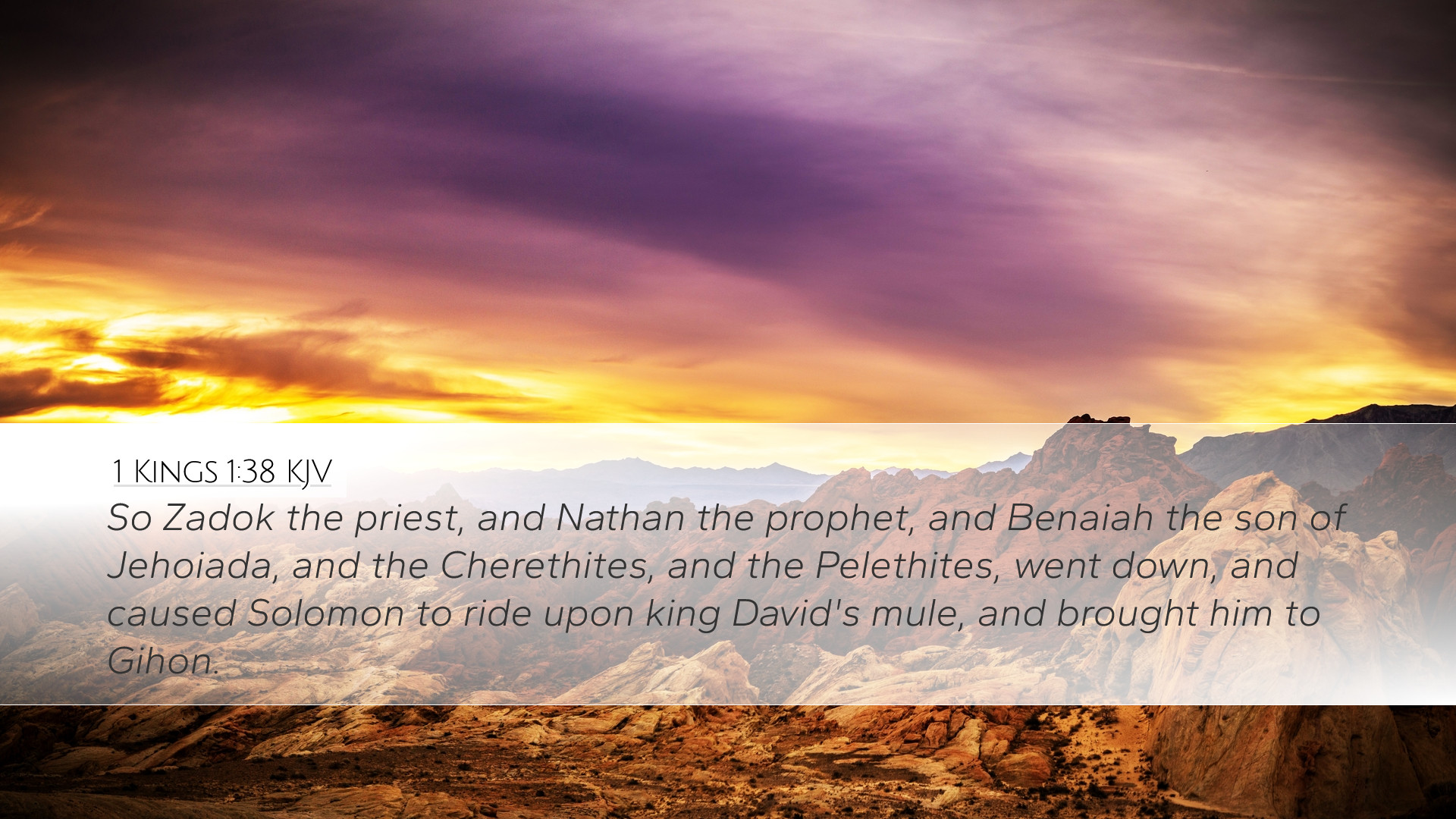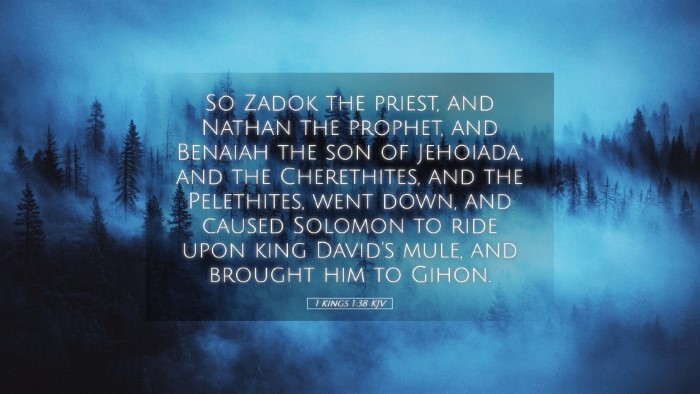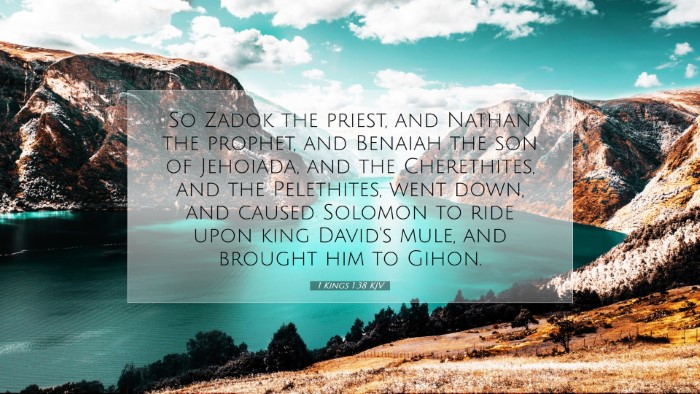Commentary on 1 Kings 1:38
In 1 Kings 1:38, we witness a pivotal moment in the transition of power within the monarchy of Israel. This verse holds great significance in understanding the unfolding narrative of King David’s intentions regarding the succession of his throne. It reads:
"So Zadok the priest, Nathan the prophet, and Benaiah son of Jehoiada, went down and had Solomon mount King David's mule, and they escorted him to Gihon."
Contextual Background
The events of 1 Kings 1 unfold during a critical time in Israelite history. As David grows older and more feeble, his son Adonijah takes it upon himself to claim the throne, disregarding his father's intentions for Solomon to succeed him. This tumult manifests the complexities of royal succession and the influence of familial relationships, political alliances, and prophetic guidance in ancient Israel.
Exegetical Insights
The actions described in this verse are emblematic of a carefully orchestrated ceremony to legitimize Solomon’s claim to the throne. Various public domain commentaries provide invaluable insights into this passage.
Matthew Henry's Commentary
Matthew Henry emphasizes the importance of the religious and prophetic endorsement surrounding Solomon's ascension. He points out that Zadok the priest and Nathan the prophet represent divine approval and the right ordering of this transition. Henry notes, “The anointing of Solomon, with the holy oil, was intended to show that he was appointed of God to this high office, thus securing the legitimacy of his reign.” Furthermore, the act of Solomon riding on David’s mule symbolizes humility and the nature of his kingship, distinguishing it from that of Adonijah who sought an earthly and extravagant display.
Albert Barnes’ Notes
Albert Barnes sheds light on the implications of Solomon riding the king’s mule. He observes that this act signified royal authority, as animals often represented status in ancient cultures. Barnes writes, “In the East, the king's mule was a symbol of kingship, and Solomon's riding on it indicated that he was recognized as the king.” This moment not only represents a physical journey to Gihon but also a spiritual affirmation of God’s chosen leader. Barnes also discusses the significance of Gihon, noting its historical context as a place associated with Israel’s important events, including the kingship of David himself.
Adam Clarke’s Commentary
Adam Clarke, in his systematic approach, offers a host of insights into the characters involved. He highlights Benaiah, who was the commander of David’s army, underscoring the military support for Solomon’s kingship. Clarke states, “The presence of Benaiah in this act of anointing represents the military backing and the importance of a strong leader in sustaining the integrity of the kingdom.” Clarke also emphasizes the strategic alliance of the priesthood and the prophetic office, illustrating the crucial role these figures play in not just political but also spiritual governance within the nation of Israel.
Theological Implications
This verse serves as a rich theological tapestry woven with themes of divine sovereignty, the nature of true leadership, and the relationship between politics and faith. It serves to remind faith leaders and scholars alike of the divine order established in governance.
-
Divine Sovereignty:
The anointing process illustrates God's hand in the affairs of men. Solomon’s ascension, orchestrated with prophetic insight, reinforces the notion that true authority originates from God.
-
Leadership Characteristics:
Humility, as symbolized by the mule rather than a war horse, serves as a directive for leaders today. Leaders are called to serve, reflecting the servant nature of Christ.
-
Prophetic Endorsement:
The partnership of prophets and priests in crowning Solomon underlines the importance of spiritual leaders in the church and state. Today, pastors and theologians must recognize their prophetic role in guiding nations and communities.
Application for Contemporary Leadership
As we contemplate the ramifications of this passage, it becomes an essential study for pastors and leaders in faith communities, calling for an evaluation of their leadership styles. The scriptural narrative prompts a reflection on whether leaders exhibit qualities of humility, divine obedience, and righteousness in their governance.
Furthermore, through this passage, one can discern the critical importance of backing one’s leadership with sound theological understanding and spiritual authority. The intertwining of politics with faith calls for a sober approach in navigating leadership roles, as they influence not just temporal matters but eternal consequences.
Conclusion
In summary, 1 Kings 1:38 encapsulates a crucial transition within Israel’s monarchy that is rich with theological significance, historical insight, and practical implications for contemporary leaders. The collective insights from Matthew Henry, Albert Barnes, and Adam Clarke converge to illuminate the core fields of divine sovereignty, proper leadership, and the importance of spiritual legitimacy in authority.
As we engage with this text, let it be a foundation for our understanding of how God's providence directs human affairs, and may we strive to reflect the character of Christ in our own leadership journeys.


